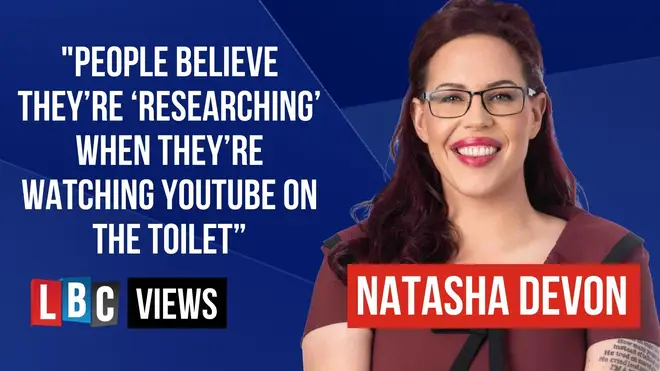
Paul Brand 10am - 12pm
1 July 2021, 17:08 | Updated: 1 July 2021, 17:35

LBC Presenter Natasha Devon MBE explains why she is is so dismayed by Chris Whitty being harassed, and shares what this represents about our society.
In an age where expertise is denigrated, where people genuinely seem to believe they’re ‘researching’ when they’re watching YouTube videos on the toilet, where politicians behave like celebrities and celebrities are getting involved in politics, it was inevitable (if deeply uncomfortable) to see a video of the government’s Chief Medical Advisor Chris Whitty being harassed by a couple of thugs as he tried to walk through a park earlier this week.
Incidents like this became unavoidable when we began buying into narratives which claimed universities were full of ‘lefty’ academics trying to indoctrinate young people, that education is worthless and that everyone’s opinion, however ill-informed, is equally valid. Michael Gove summed it up in 2016 when he said the country has ‘had enough of experts’.
That’s not to say, of course, that academic learning is the only way to gain expertise. A nurse who has worked in the NHS for a decade, for example, will be more of an expert on the inner workings of NHS than most. A disabled person is more of an expert on what it’s like to live with a disability than those who haven’t. A black or brown person is more of an expert on whether Britain is a racist country than a white person.
I always think of the truth as like a patchwork quilt. Everyone’s an expert on something and we can all own our particular patch. But when venturing out of our patch it’s important we learn to defer to others whose expertise are greater than ours.
Sometimes, for example, I correct people when they introduce me as ‘an expert on mental health’. I suppose, having survived mental health issues makes me a kind of expert by experience, but all the science that informs my talks in schools and what I write in my books comes from neuroscientists, psychologists and psychiatrists far more qualified than I.
If I’m an expert in anything, it’s how to translate their research into something which is (hopefully) engaging and relevant for an audience of young people, a job I’ve been doing for (at the time of writing) almost thirteen years.
Being a presenter on LBC has also taught me that a genuine expert is more likely to give a nuanced answer. The people who call in to my show who know the most are more likely to say ‘well, it’s not quite as simple as that’ or ‘we don’t know that for sure but the evidence would suggest….’.
Sometimes, the most honest and informed answer a person can give is ‘I don’t know’. Too often, these thoughtful responses are drowned out by the populists and gobs on sticks who shout simple slogans or dramatic conspiracy theories to catch our attention.
Having all the information in the world at our fingertips doesn’t make us experts in everything, or indeed anything.
In fact, being bombarded with so much content via the internet has been shown in studies to make us stupider. We cling to simple narratives, which can comfort us when we feel overwhelmed. If living life during the age of internet has taught me one thing, it’s to cherish and defer to genuine expertise.
That’s why I’ve watched the incremental degradation of learning and the celebration of ignorance over the past ten years or so through splayed fingers - and why the Chris Whitty video left me so dismayed.
As a person who has dedicated his life to obtaining the extensive qualifications which have allowed him to become a physician and professor of epidemiology, not to mention one of only a handful of genuinely objective individuals contributing to government policy on Covid, he deserved more respect.
Giving everyone’s views equal weight might sound like a lovely, utopian idea but it actually leads to complete chaos, widespread disinformation, social disharmony and even death.
For, as American writer Harlan Ellison said “You are not entitled to your opinion. You are entitled to your *informed* opinion. No one is entitled to be ignorant.”